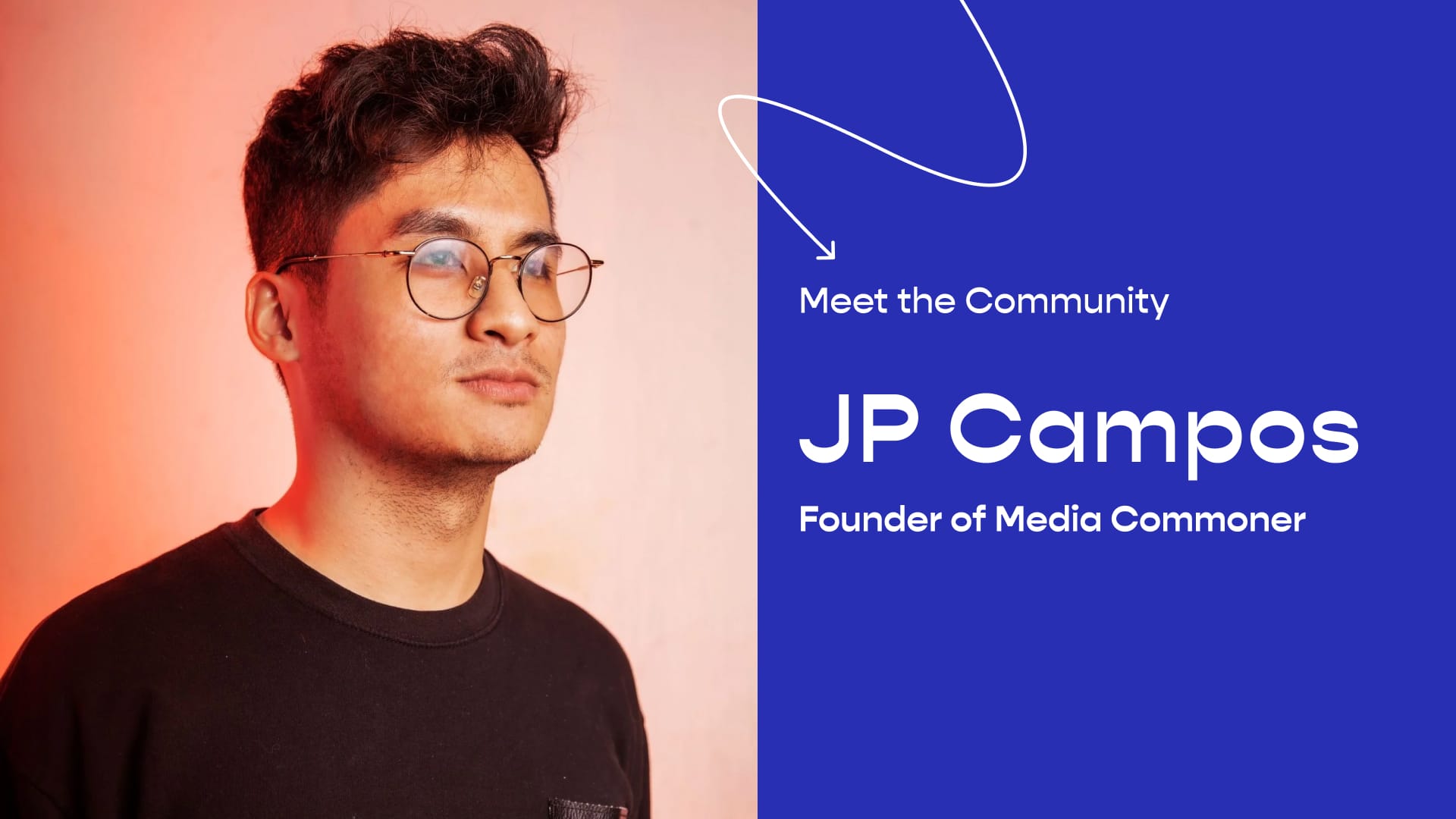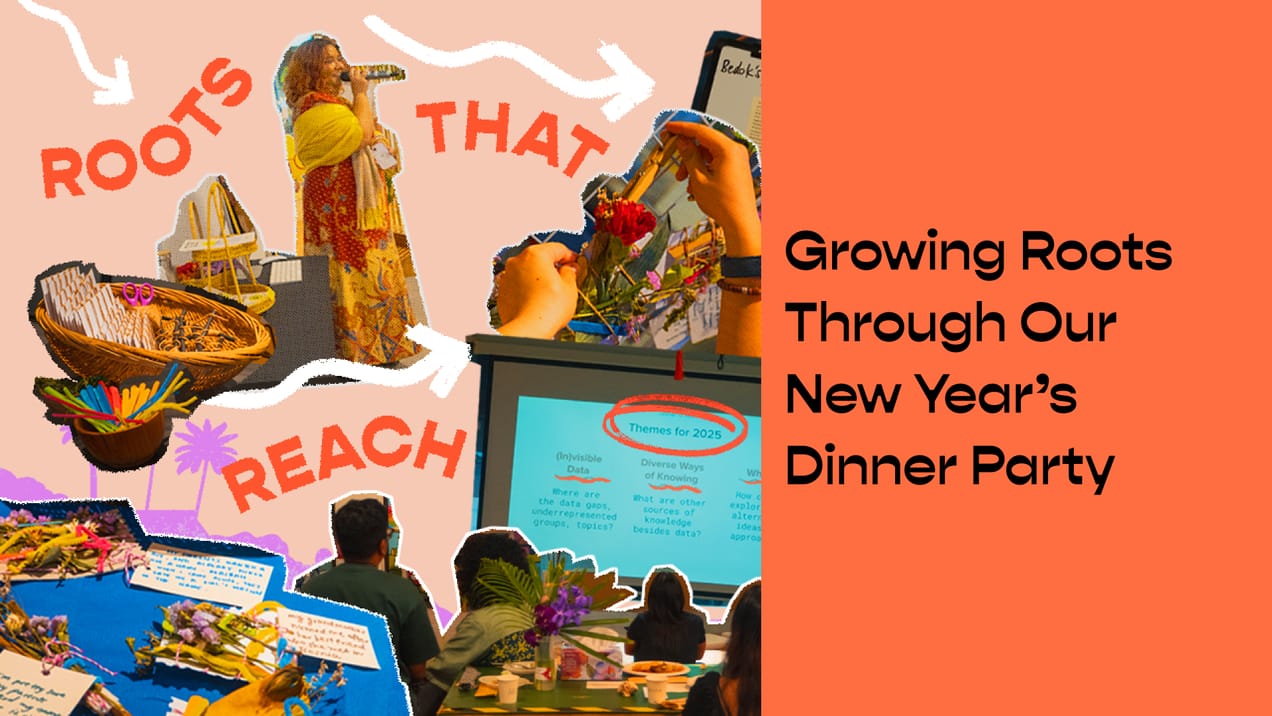
Meet the Community: JP Campos

JP Campos is the founder of Media Commoner, otherwise known as Commoner, a social media-first independent media organisation based in the Philippines. He is also a Multimedia Executive Producer at Provill Studios, a Manila-based film production agency. Amidst a transformative year, JP contemplates the evolving responsibilities of storytellers in the era of artificial intelligence, emphasising the need to preserve our human touch and community as storytellers in Southeast Asia.
JP, you wear multiple hats. You’re a producer, founder of Media Commoner, and a fashion icon (at least, in my eyes). Give me an overview of how you found yourself here in this specific career path of yours.
As a kid, I’ve always had this inkling that I’m supposed to be in the creative industry. I joined writing and speech competitions, which we have a lot of in the Philippines. Then, in college, I took up communications. But in my third year, I almost didn’t make it to school because my family ran out of money. So I had to be creative again and find a way to go to school.During summer break, I applied for and got two scholarships. I also worked in the Social Sciences library, which was kind of serendipitous because that’s where all the advertising, art, and marketing books were. I realised I wanted to use my creativity as a tool to share what I’m learning at any moment. In my final year of college, I was asked to be a multimedia producer for television. At that time, multimedia production was basically unheard of. Social media wasn’t really a thing—it was just websites and Facebook. So I’ve been doing production for eight years now. I became an executive producer at the ripe old age of 23 (laughs) and I’m 28 now, making me the youngest executive producer in our company. So I’ve had all these successes. But during the pandemic, I was longing for more. I couldn’t go out, there was no travelling, and everything was locked down. And that’s how I came up with Commoner because, to me, writing is a meaning-making process—it’s a way for us to make sense of the experiences of our lived reality.
So to answer your question, I just embraced my own complexity, because we're all capable of so many things. We're just limited by time or space.
I completely understand the itch to dip your feet into a bit of everything. That’s also how creativity works, right? It’s about drawing connections between things that people might have not originally thought to draw.
Being in the creative industry is such a humbling experience because you realise, “Oh, I don't know a lot of things.” But there’s also a sense of pride, because you’re coming up with a creation out of nothing but your mind. And you [have the power] to create something that people can enjoy, relate to, be happy, or be sad about. [Being creative] is the closest thing we have to magic. And I love it. I don't want to be limited to just one thing. What a waste of a life if I'm just going to be known for one thing.
People always think of creativity as a solo pursuit—like it’s one person doing all his magic. When did you start thinking about creativity beyond just the individual, and through a more communal lens?
When I started working on Commoner, it was kind of a solo pursuit. I was doing the writing, research, and design all on my own. But I realised that was not a very productive use of my time. And when someone tries to do all those things [by themselves], I can't help but think, “Oh, he's too proud.” I didn't want to be too proud of myself. [Just because] I can do all those things, [doesn’t mean] I want to. There are people out there who are better at certain things than me. So I like [the fact that] while I'm working on projects, I'm building connections and fostering relationships, and building a community around me that’s filled with passionate people who have their own expertise.
I loved what you said about writing as a way of meaning-making, as a way to create a new world. I see creativity and community as [an important] part of that.
In the 28 years that I've been alive, writing has been my go-to skill. It’s the thing that I'm the most confident about. I’m no Maya Angelou, but it's comfortable enough that I can sit with its inconvenience and discomfort. It’s hard and sometimes pushes me to the brink of insanity, but it's comfortable enough that I can go back to it. And that's what I really did with Commoner [because] I knew I [could do it] decently, you kn—
Hang on, my FoodPanda is here. Give me five minutes (laughs).
Five minutes later, following a brief FoodPanda-induced intermission…
You’ve described Media Commoner as a social media-first organisation. What was the inspiration behind this approach?
I was classically trained in the media industry. I studied radio, television, and newspaper. Then when I entered the real world as a professional, [I realised] the things that I studied were like, from 40 years ago. Even for media organisations that have transitioned to digital platforms, I still didn't relate to them—I didn't feel like they were reflecting what was on my mind. So I spent years just consuming things that are beyond traditional [media] and more experimental. I collect magazines that don't really look like magazines, and I really enjoy poring over them and looking at how they lay things out, how they talk about things.There’s also the internet, so many vloggers, podcasts, and Instagram pages. And I mixed [these] together to come up with Commoner. So there’s a spirit of experimentation with how we present our stories.
The name Media Commoner came from my [initial] philosophy that media organisations should present stories in ways that common people can understand. But this year, I've been contemplating the name itself. And then I realised, thinking that the media should present things in ways that common people can understand feels like I am “dumbing down” my story.
I [now] realise that [what] resonates with a lot of people about Commoner are our writers. I never thought of myself as the expert, the singular authority of a story, but I [focused on] reversing the “roles” [of writer and reader]. Suddenly, I see that I am really just a commoner too, and I see things the way a common person [does]. I [should not have to] dumb my [story] down, [but instead] tell the story in the best way I can, with the capabilities [I have] and the knowledge I am able to gather.
The media [used to be] the gatekeeper of the information ecosystem. That's not true anymore. You have so many players in the field. Now, [anyone] can be a source of information. [But what] sets us apart? Anyone can assume our position [and] copy what we are doing. But in order for us to gain the trust of the public, they have to feel that we are with them.
I was reading about the collapse of artificial intelligence. So many people were talking about how it’s the end of humanity as we know it and how it’s going to steal jobs. Some of those concerns are genuine. But when I think about it, the jobs and professions that will be spared by the AI takeover are those that have a very distinctive human touch. Because AI cannot replicate the human touch. So if we want to keep our jobs, as storytellers or journalists, we have to make sure that our stories [retain] that human touch.
What were some of the biggest hurdles you faced in building Media Commoner, especially with how it was such a new thing?
The usual challenges are funding, scaling, and relationships with partners and advertisers. Those are [normal for new media organisations]. But there are these issues that I often don't talk about, like our personhood and our own humanity. We often forget about them. And usually we see them from an individualistic point of view, like, “Okay, I'm having a hard time and maybe this is my fault. Maybe I have to change something.” But [by thinking this way,] I think we're forgetting that the term “shared humanity” exists for a reason.
I really couldn't do my job as a storyteller without knowing who I am. [In the past year], [I realised that apart from my triumphs and achievements, knowing who I am] was also about admitting that I have issues and traumas that I [stored] away so that I could keep moving forward as a professional. This past year, I finally found the time to sit with my thoughts, feelings, ambitions, and visions of who I am. Even though some of the thoughts that came up were ugly and uncomfortable, they were honest. And I didn't judge myself for having those honest and vulnerable feelings. And now I feel like I'm ready to move forward and embark on a new path.
I think as media professionals, we have to take that time to sit with our uncomfortable feelings and comfort ourselves, and tell ourselves that, yeah, [some of our thoughts may be] ugly, but at least they're honest. And isn't honesty the name of the game? Honesty is what makes us effective storytellers. If we get to the point [where] we allow ourselves to be vulnerable, [whether it’s] by ourselves or with a group of people who will keep an open space for us, who will let us be, who will let us feel our feelings, we'd be better storytellers.
You’re going to make me cry! It’s true. As storytellers we do have that narrative where we feel like we shove aside our feelings and humanity to get the work done. But when you're doing something as personal as storytelling or any kind of creative work, we don’t realise our humanity is embedded at every stage of that. Or maybe we’re too scared to admit that it does bleed into our work. It’s time to stop thinking about our feelings as inconveniences when we do our work.
If we force ourselves to be stoic about the stories we [tell], to be as objective as possible [like robots], we will be replaced by robots. Our humanity is what makes us so special and magical—it is what makes us amazing storytellers.


